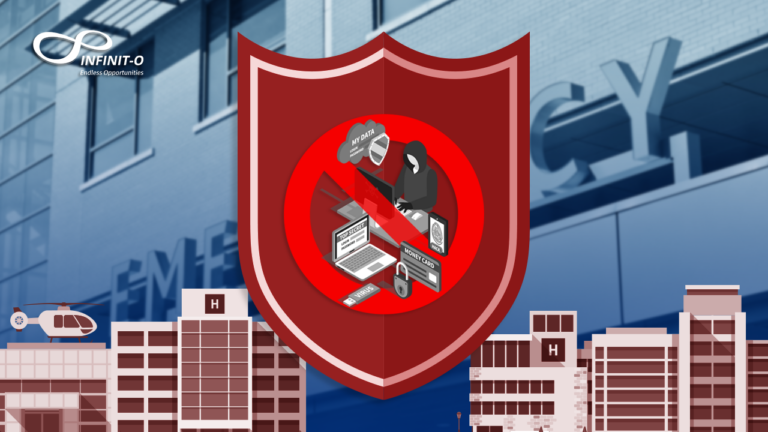A Quick Guide on How to Ensure Data Security in Healthcare BPO
The healthcare industry has embraced Business Process Outsourcing (BPO) as a means to improve operational efficiency, reduce costs, and enhance patient care. Yet, with the increasing reliance on digital systems and the exchange of sensitive patient information, improving data security in healthcare BPO has become the next challenge.
In the medical sector, securing data through BPO solutions is of the utmost importance. By thoroughly examining risks, challenges, and best practices in data security, organizations commit to safeguarding patient privacy and maintaining the integrity of their operations.
So, What is Data Security?
Data security refers to the practice of protecting digital data from unauthorized access, alteration, theft, or damage. The primary goal of data security is to ensure adherence to the pillars of information security often referred to as the “CIA Triad“:
- Confidentiality: This means that data is only accessible to authorized individuals or systems. Confidential information, such as patient data and medical records, cannot be disclosed or accessed by unauthorized parties.
- Integrity: Data integrity ensures that information is accurate and remains unaltered by unauthorized or malicious parties. It guarantees that the data stored is reliable and has not been tampered with.
- Availability: Data should be accessible and available to authorized users when needed. It ensures that systems and data are not compromised or disrupted by security incidents.
Generally, data security measures include various technologies, policies, and practices aimed at safeguarding data from cyberattacks, data breaches, and malware. A few common protocols to secure data involve encryption, access controls, firewalls, intrusion detection systems, regular data backups, and security awareness training for personnel.
As for data security in healthcare BPO, this refers to specialized measures in place to protect sensitive patient data, such as patient names, contact details, physical address, social security identifiers, medical records, images, and biometric data, when healthcare organizations delegate administrative processes to third-party services. It encompasses a set of stringent protocols and compliance standards designed to ensure the CIA in data security in outsourcing.

How Do You Ensure Data Security in Healthcare BPO?
Patient health information (PHI) is among the most sensitive data as it contains an individual’s complete personal information and medical history. Ensuring its security is not just a legal obligation but also essential for maintaining patient trust and protecting their confidentiality.
To understand more about the data security measures that healthcare organizations and BPO providers must implement, here are some of the best practices:
1. Regulatory Framework and Compliance
Observance of data privacy regulations that mandate stringent security and privacy measures is non-negotiable for healthcare organizations and BPO services. BPO companies catering to the medical industry must be knowledgeable of international, national or federal, and state healthcare data security standards data security practices.
For global operations, healthcare BPOs must consider compliance with international data protection laws that are practiced in specific localities. Some examples of international regulations are:
- European Union General Data Protection Regulation (GDPR)
- Health Insurance Portability and Accountability Act (HIPAA) in the United States
- Personal Information Protection and Electronic Documents Act of Canada (PIPEDA)

2. Data Encryption and Secure Transmission
Part of securing data is implementing robust encryption mechanisms for data at rest and in transit to ensure that patient health information remains secure even in cases of unauthorized access. In terms of securing data transmission, using protected channels such as virtual private networks (VPNs) and encrypted emails are pertinent measures in any form of information exchange.
3. Access Control and Authentication
Implementing role-based access control ensures that only authorized individuals can access specific patient health information, limiting the risk of data breaches. Plus, integrating multiple-factor authentication measures adds an extra layer of security that makes it more challenging for unauthorized users to gain data access.

4. Employee Training and Awareness
Both healthcare BPO services and organizations must hold comprehensive security training for their respective employees to raise awareness and ensure adherence to security protocols. Fostering a culture of security awareness among teams ensures that security practices become second nature, reducing the likelihood of accidental breaches.
5. Vendor Assessment and Due Diligence
Healthcare organizations must conduct rigorous assessments of their BPO partners to evaluate their data security measures and adherence to regulatory requirements. This due diligence ensures that their partner services can keep healthcare information confidential.
Then, continuous monitoring and assessment of the third-party vendors’ security practices are essential to maintain data security throughout the partnership.

6. Disaster Recovery and Business Continuity
Having well-defined disaster recovery plans ensures that data can be restored, and operations can resume swiftly in the event of a security incident. After all, business continuity planning is critical to minimize downtime and ensure the uninterrupted availability of healthcare services in the face of security incidents.
7. Leveraging Emerging Technologies
With the abundance of technological advancements nowadays, medical data security must remain updated. This ensures that patient health information remains of the highest quality, limiting opportunities for data breaches.
One way to leverage innovations in technology is to use artificial intelligence (AI) and machine learning to enhance threat detection, anomaly monitoring, and predictive analysis. These methods can further bolster data security.
Also, exploring blockchain technology opens more opportunities to share information within a business network. This system improves the efficiency of data management while protecting patient information through built-in security mechanisms that prevent unauthorized access.

8. Incident Response and Reporting
Establishing incident response plans and designated response teams ensures that security incidents are addressed promptly and effectively. Then, adhering to the legal requirements for reporting data breaches is necessary to maintain transparency and trust with patients and regulatory authorities.
In the healthcare industry, employing data security best practices can ensure proper safeguarding of patient information. The risks posed by data breaches and cyberattacks are too great to overlook, considering the sensitivity of patient data and the regulatory framework in place.
By implementing robust data security strategies and following regulatory requirements, healthcare organizations and their BPO partners can effectively protect an individual’s privacy while reaping the benefits of outsourcing.
Securing Patient Data in Healthcare BPO with Infinit-O
Infinit-O is an expert business process outsourcing company with years of experience in healthcare data security. Investing in our services lets businesses gain access to a wealth of expertise, cutting-edge technology, and a commitment to the highest standards of data security.
Let us navigate the complexities of healthcare BPO, implement best practices, and ensure that patient data remains safeguarded at every turn. Partner with Infinit-O to embark on a journey of data security excellence, where patient trust and confidentiality are held in the highest regard.
Contact us today to learn more about our services!
Infinit-O is the trusted customer-centric and sustainable leader in Business Process Optimization to Small and Medium businesses in the Financial Services, Healthcare and Technology sectors by delivering continuous improvement through technology, data and people.
For more information, visit: www.infinit-o.com







This site is protected by reCAPTCHA and the Google Privacy Policy and Terms of Service apply.